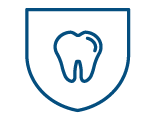We are a Highlands Ranch family dental practice offering top-notch dental care.
Dental Extractions
A dental extraction is the process of removing a tooth from its socket in the bone. A dental extraction is often performed when a tooth is damaged, decayed, or causing other dental issues. Dental extractions can be simple or surgical, depending on the complexity of the case. Extractions are not always necessary and typically avoided when possible. If you are experiencing dental tooth pain, visit our amazing dentist to provide the best recommendations.
When is a Dental Extraction Necessary?
There are several reasons why a dental extraction might be necessary, including:
- Severe Tooth Decay: When a tooth is too damaged by decay to be repaired by a filling or dental crown.
- Impacted Wisdom Teeth: Wisdom teeth that don't have enough room to grow can cause tooth pain, infection, and crowding of other teeth.
- Periodontal Disease: Advanced gum disease can cause teeth to become loose, necessitating their removal.
- Overcrowding: In preparation for orthodontic treatments, some teeth may need to be removed to create space.
- Infection or Abscess: An infection that cannot be treated with antibiotics or root canal therapy may require extraction to prevent it from spreading.
Types of Dental Extractions
Simple Dental Extractions: A simple extraction is a straightforward dental procedure typically performed on teeth that are fully visible in the mouth. This type of extraction is most commonly done on teeth that are not severely damaged or impacted, making them easier to remove. During a simple extraction, our family dentist administers local anesthesia to numb the area around the tooth, ensuring that the procedure is as comfortable as possible for the patient. Because these teeth are more accessible, the extraction process is usually quick and minimally invasive.
Surgical Dental Extractions: A surgical extraction is a more complex dental procedure that is required for teeth that are broken, have not fully erupted, or are impacted, such as wisdom teeth. Unlike simple extractions, surgical extractions often involve making a small incision in the gum to access the tooth. In some cases, it may also be necessary to remove a portion of the bone surrounding the tooth to facilitate its removal. Depending on the complexity of the case and the patient's comfort level, this procedure is typically performed under local anesthesia, but sedation or general anesthesia may also be used. Surgical extractions are carefully planned and executed to ensure the best possible outcome and patient comfort.
What to Expect During a Dental Extraction
During a dental extraction, the process typically begins with a consultation, where our local dentist will examine your tooth, review X-rays, and discuss your treatment options. Once a plan is in place, local anesthesia will be administered to numb the area around the tooth, ensuring your comfort. In more complex cases, sedation or general anesthesia might be recommended.
The extraction itself varies depending on the type of procedure. For a simple extraction, our amazing dentist will loosen the tooth using an elevator and then remove it with forceps. If a surgical extraction is required, our dentist or a specialist oral surgeon will make a small incision in the gum, and, if necessary, remove some bone around the tooth before extracting it.
After the procedure, you'll receive detailed instructions on how to care for the extraction site to encourage proper healing and minimize any risk of complications.
- Consultation: Visit our local dentist in Highlands Ranch to first examine your tooth, review X-rays, and discuss your options.
- Anesthesia: Local anesthesia is administered to numb the area around the tooth if removal is recommended. For more complex cases, sedation or general anesthesia may be used.
- Extraction:
- Simple Extraction: Our dentist will loosen the tooth with an elevator and remove it with forceps.
- Surgical Extraction: Our dentist or a referred oral surgeon will make an incision in the gum, possibly remove bone, and then extract the tooth.
- Post-Extraction Care: After the tooth is removed, you will receive instructions on how to care for the extraction site to promote healing and avoid complications.
Dental Recovery and Aftercare
Proper care after a dental extraction is crucial for a smooth recovery. Here are some tips:
- Control Bleeding: Use gauze pads as directed to help form a blood clot at the extraction site.
- Manage Pain: Over-the-counter pain relievers and prescribed medications can help manage discomfort.
- Reduce Swelling: Apply an ice pack to your cheek for 10-minute intervals to reduce swelling.
- Follow a Soft Diet: Stick to soft foods like yogurt, mashed potatoes, and soups for the first few days.
- Avoid Straws and Smoking: Sucking can dislodge the blood clot, leading to a painful condition known as dry socket.
- Oral Hygiene: Gently rinse your mouth with salt water as directed, typically 24 hours after the extraction to keep the area clean.
Risks and Complications
While dental extractions are generally safe, there are potential risks, including:
- Dry Socket: Occurs when the blood clot fails to develop or is dislodged from the socket.
- Infection: Although rare, infection can occur if bacteria enter the extraction site.
- Nerve Injury: This is an uncommon complication that may occur with wisdom teeth extractions.
Frequently Asked Questions (FAQs)
Q: How long does it take to recover from a dental extraction?
A: Most people recover within a few days, but complete healing of the extraction site may take a few weeks.
Q: Will I need someone to drive me home after the procedure?
A: If you’ve had sedation or general anesthesia, it's advisable to have someone drive you home.
Q: Can I replace the extracted tooth?
A: Yes, there are several options to replace an extracted tooth, including dental implants, dental bridges, and dentures. Our local dentist will discuss these with you during your consultation.
Find a Dentist Near Me
If you believe you need a dental extraction or have been advised to have a dental extraction, please contact Mountain West Family Dental to schedule an appointment. Our experienced team is here to ensure your comfort










